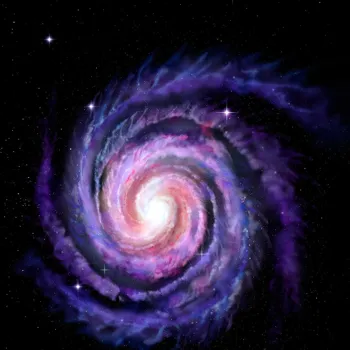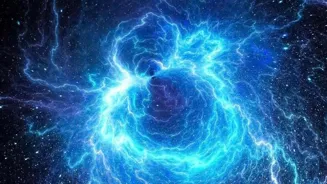Unraveling the Enigma of Dark Energy: What Drives the Universe Apart? Delve into the mystery that reshapes cosmology
For centuries, human beings have looked up at the night sky, wondering about the cosmos
and our place in it. We've charted planets, discovered stars, and unravelled some of the universe's deep mysteries. Yet, the cosmos has always stayed ahead of us with something new.
Now, the scientific community is grappling with one of its biggest puzzles yet: dark energy. This mysterious force is responsible for the accelerated expansion of the universe, reshaping our understanding of cosmology. What is this dark energy and what does it mean for the future of our universe?
Dark energy accelerates universe expansion, comprising 68% energy density
Dark energy is not something you can see. It is not something you can hold. In fact, we can't directly observe dark energy, making it all the more puzzling. Its existence is inferred from its effect on the universe’s expansion.
Based on studies done on Type Ia supernovae, which are exploding stars that act like cosmic mile markers. These studies reveal that the universe is not only expanding, but its expansion is accelerating.
Scientists believe dark energy makes up approximately 68% of the total energy density of the universe. This leaves only a small percentage for ordinary matter and dark matter. Its abundance hints that we are missing a profound piece of the cosmic puzzle.
Its very existence challenges our current understanding of physics.
Theory of cosmological constant as dark energy in space
One of the leading theories of dark energy is the cosmological constant. This theory suggests that dark energy is an intrinsic property of space itself. It has a constant energy density and fills the universe uniformly.
Einstein first introduced the cosmological constant into his theory of general relativity. He did this to create a static universe. He later rejected the idea calling it his "biggest blunder". But it was revived as a possible explanation for the accelerated expansion.
The cosmological constant predicts a constant expansion rate. But, it doesn't explain its observed value. Some scientists have proposed alternative models beyond general relativity to explain the origin of this force.
Quintessence theory offers dynamic dark energy with varying density
Another popular theory is quintessence. This introduces a dynamic, time-evolving form of dark energy. Unlike the cosmological constant, quintessence suggests that dark energy's density can change over time. It can also vary in different regions of space. This model involves a scalar field.

The field permeates the universe and interacts with gravity. Quintessence models have the benefit of offering a more natural explanation for the current energy density of dark energy. They also provide a way to reconcile it with the observed expansion rate of the universe.
However, they introduce new challenges. They also require the existence of fundamental scalar fields with unusual properties that have not been seen in experiment.
Modern cosmology's quest to unravel dark energy's mysteries using various methods
The question of what dark energy is remains one of the most important in modern cosmology. To understand it, scientists are exploring several avenues. These include large-scale structure surveys, weak gravitational lensing measurements, and detailed observations of the cosmic microwave background.
These methods seek to map the distribution of matter in the universe, measure the distortion of light by gravity, and study the afterglow of the Big Bang. All of these are used in conjunction to gather clues about the impact of dark energy on the evolution of cosmic structures.
New experiments are being designed and built to gain deeper insights. They will hopefully shed light on the true nature of this elusive force.
Unraveling dark energy's impact on universe's fate
Unravelling the mystery of dark energy is important not only for our understanding of the universe's past and present, but also for its future. The fate of the cosmos depends on the behaviour of this mysterious force. If dark energy continues to accelerate, the universe could expand forever.

This would lead to a "Big Freeze," where galaxies drift apart and stars eventually burn out, leaving a cold, dark, and empty universe. On the other hand, if dark energy weakens or reverses, the universe could collapse in on itself. This could result in a "Big Crunch.
" The exploration of dark energy represents one of the ultimate quests in science. It challenges our fundamental understanding of physics and inspires us to push the boundaries of knowledge.
AI Generated Content. Glance/InMobi shall have no liability for the content














